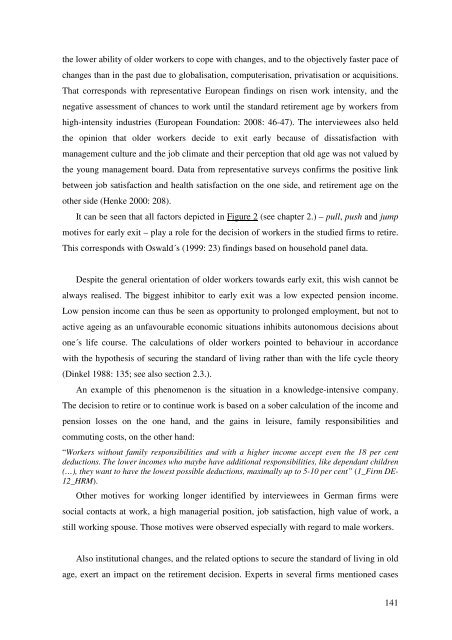Dissertation_Paula Aleksandrowicz_12 ... - Jacobs University
Dissertation_Paula Aleksandrowicz_12 ... - Jacobs University
Dissertation_Paula Aleksandrowicz_12 ... - Jacobs University
You also want an ePaper? Increase the reach of your titles
YUMPU automatically turns print PDFs into web optimized ePapers that Google loves.
the lower ability of older workers to cope with changes, and to the objectively faster pace of<br />
changes than in the past due to globalisation, computerisation, privatisation or acquisitions.<br />
That corresponds with representative European findings on risen work intensity, and the<br />
negative assessment of chances to work until the standard retirement age by workers from<br />
high-intensity industries (European Foundation: 2008: 46-47). The interviewees also held<br />
the opinion that older workers decide to exit early because of dissatisfaction with<br />
management culture and the job climate and their perception that old age was not valued by<br />
the young management board. Data from representative surveys confirms the positive link<br />
between job satisfaction and health satisfaction on the one side, and retirement age on the<br />
other side (Henke 2000: 208).<br />
It can be seen that all factors depicted in Figure 2 (see chapter 2.) – pull, push and jump<br />
motives for early exit – play a role for the decision of workers in the studied firms to retire.<br />
This corresponds with Oswald´s (1999: 23) findings based on household panel data.<br />
Despite the general orientation of older workers towards early exit, this wish cannot be<br />
always realised. The biggest inhibitor to early exit was a low expected pension income.<br />
Low pension income can thus be seen as opportunity to prolonged employment, but not to<br />
active ageing as an unfavourable economic situations inhibits autonomous decisions about<br />
one´s life course. The calculations of older workers pointed to behaviour in accordance<br />
with the hypothesis of securing the standard of living rather than with the life cycle theory<br />
(Dinkel 1988: 135; see also section 2.3.).<br />
An example of this phenomenon is the situation in a knowledge-intensive company.<br />
The decision to retire or to continue work is based on a sober calculation of the income and<br />
pension losses on the one hand, and the gains in leisure, family responsibilities and<br />
commuting costs, on the other hand:<br />
“Workers without family responsibilities and with a higher income accept even the 18 per cent<br />
deductions. The lower incomes who maybe have additional responsibilities, like dependant children<br />
(…), they want to have the lowest possible deductions, maximally up to 5-10 per cent” (1_Firm DE-<br />
<strong>12</strong>_HRM).<br />
Other motives for working longer identified by interviewees in German firms were<br />
social contacts at work, a high managerial position, job satisfaction, high value of work, a<br />
still working spouse. Those motives were observed especially with regard to male workers.<br />
Also institutional changes, and the related options to secure the standard of living in old<br />
age, exert an impact on the retirement decision. Experts in several firms mentioned cases<br />
141
















